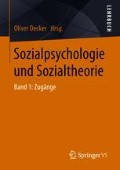Zusammenfassung
Dieses Kapitel beschäftigt sich mit den Grundzügen der quantitativen Forschungsmethodik in der Sozialpsychologie. Anfangs verdeutlichen wir, was unter wissenschaftlichen Hypothesen zu verstehen ist, welchen Kriterien sie genügen müssen und welche Arten von Hypothesen zu unterscheiden sind. Anschließend beschäftigen wir uns mit den Konzepten „Population“ und „Stichprobe“ sowie mit der Frage, wie Messwerte erhoben werden können und welche Gütekriterien die verwendeten Messverfahren erfüllen müssen. Danach behandeln wir ausführlich, wie quantitative Untersuchungen angelegt werden und welche Besonderheiten die einzelnen Ansätze haben. Im Zuge dieser Schilderungen gehen wir auch auf die statistische Auswertung quantitativer Forschung ein.
Access this chapter
Tax calculation will be finalised at checkout
Purchases are for personal use only
Preview
Unable to display preview. Download preview PDF.
Literatur
Asendorpf, J. (1997). Schüchternheits- und Geselligkeitsskalen für Erwachsene. Berlin: Humboldt-Universität, Institut für Psychologie.
Bühl, A. (2014). SPSS 22. Einführung in die moderne Datenanalyse (13. Aufl.). Hallbergmoos: Pearson.
Campbell, D. T. (1957). Factors relevant to the validity of experiments in social settings. Psychological Bulletin, 54, 297–312.
Campbell, D. T. & Fiske, D. W. (1959). Convergent and discriminant validation by the multitrait-multimethod matrix. Psychological Bulletin, 56, 81–105.
Campbell, D. T. & Stanley, J. C. (1963). Experimental and quasi-experimental designs for research on teaching. In N. L. Gage (ed.), Handbook of research on teaching (pp. 171–246). Chicago, IL: Rand McNally.
Campbell, D. T. & Stanley, J. C. (1966). Experimental and quasi-experimental designs for research. Chicago, IL: Rand McNally.
Cohen, J. (1988). Statistical power analysis for the behavioural sciences (2nd ed.). Hillsdale, NJ: Erlbaum.
Cook, T. D. & Campbell, D. T. (1979). Quasi-experimentation. Design and analysis issues for field settings. Boston: Houghton Mifflin.
Eid, M. & Schmidt, K. (2014). Testtheorie und Testkonstruktion. Göttingen: Hogrefe.
Eid, M., Gollwitzer, M. & Schmitt, M. (2015). Statistik und Forschungsmethoden (4. Aufl.). Weinheim: Beltz.
Gollwitzer, M. & Jäger, R. S. (2014). Evaluation – kompakt (2. Aufl.). Weinheim: Beltz.
Greenwald, A. G., McGhee, D. E. & Schwartz, J. K. L. (1998). Measuring individual differences in implicit cognition. The implicit association test. Journal of Personality and Social Psychology, 74, 1464–1480.
Huber, O. (2013). Das psychologische Experiment. Eine Einführung (6. Aufl.). Bern: Huber.
Hussy, W. & Jain, A. (2002). Experimentelle Hypothesenprüfung in der Psychologie. Göttingen: Hogrefe.
Janoff-Bulman, R., Carnes, N. & Sheikh, S. (2014). Parenting and politics. Exploring early moral bases of political orientation. Journal of Social and Political Psychology, 2, 43–60.
Luhmann, M. (2015). R für Einsteiger. Einführung in die Statistiksoftware für die Sozialwissenschaften (4. Aufl.). Weinheim: Beltz.
Moosbrugger, H. & Kelava, A. (Hrsg.) (2012). Testtheorie und Fragebogenkonstruktion (2. Aufl.). Berlin: Springer.
Mummendey, H. D. & Grau, I. (2014). Die Fragebogenmethode. Grundlagen und Anwendung in Persönlichkeits-, Einstellungs- und Selbstkonzeptforschung (6., korr. Aufl.). Göttingen: Hogrefe.
Orne, M. T. (1962). On the social psychology of the psychological experiment. With particular reference to demand characteristics and their implications. American Psychologist, 17, 776–783.
Petermann, F. & Petermann, U. (2012). Training mit aggressiven Kindern. Einzeltraining – Kindergruppe – Elternberatung (13. Aufl.). Weinheim: Beltz.
Rammstedt, B. (ed.). (2014). Grundlegende Kompetenzen Erwachsener im internationalen Vergleich. Ergebnisse von PIAAC 2012. Münster: Waxmann.
Rosenthal, R. & Jacobson, L. (1966). Teachers’ expectancies. Determinants of pupils’ IQ gains. Psychological Reports, 19, 115–118.
Schmidt-Atzert, L. & Amelang, M. (2012). Psychologische Diagnostik (5. Aufl.). Heidelberg: Springer.
Schmitt, M. (2006). Conceptual, theoretical, and historical foundations of multimethod assessment. In M. Eid & E. Diener (eds.), Handbook of multimethod measurement in psychology (pp. 9–25). Washington, DC: American Psychological Association.
Schnell, R., Hill, P. B. & Esser, E. (2013). Methoden der empirischen Sozialforschung (10. Aufl.). München: Oldenbourg.
Shadish, W. R., Cook, T. D. & Campbell, D. T. (2002). Experimental and quasi-experimental designs for generalized causal inference. Boston, MA: Houghton-Mifflin.
Taylor, S. P. (1967). Aggressive behavior and physiological arousal as a function of provocation and the tendency to inhibit aggression. Journal of Personality, 35, 297–310.
Turner, R. N. & West, K. (2012). Behavioural consequences of imagining intergroup contact with stigmatized outgroups. Group Processes Intergroup Relations, 15, 193–202.
Weise, G. (1975). Psychologische Leistungstests. Göttingen: Hogrefe.
Weiterführende Literatur
Cohen, J., Cohen, P., West, S. G. & Aiken, L. S. (2003). Applied multiple regression/correlation analysis for the behavioral sciences. Mahwah, NJ: Lawrence Erlbaum.
Hayes, A. F. (2013). Introduction to mediation, moderation, and conditional process analysis. A regression based approach. New York, NY: Guilford Press.
Kirk, R. E. (2013). Experimental design. Procedures for the behavioral sciences. Thousand Oaks, CA: Sage.
Maxwell, S. E. & Delaney, H. D. (2003). Designing experiments and analyzing data. A model comparison perspective. Mahwah, NJ: Lawrence Erlbaum.
Shadish, W. R., Cook, T. D. & Campbell, D. T. (2002). Experimental and quasi-experimental designs for generalized causal inference. Boston, MA: Houghton-Mifflin.
Author information
Authors and Affiliations
Corresponding author
Editor information
Editors and Affiliations
Rights and permissions
Copyright information
© 2018 Springer Fachmedien Wiesbaden GmbH, ein Teil von Springer Nature
About this chapter
Cite this chapter
Lemmer, G., Gollwitzer, M. (2018). Quantitative Forschung. In: Decker, O. (eds) Sozialpsychologie und Sozialtheorie. Springer VS, Wiesbaden. https://doi.org/10.1007/978-3-531-19564-3_15
Download citation
DOI: https://doi.org/10.1007/978-3-531-19564-3_15
Published:
Publisher Name: Springer VS, Wiesbaden
Print ISBN: 978-3-531-19563-6
Online ISBN: 978-3-531-19564-3
eBook Packages: Social Science and Law (German Language)

